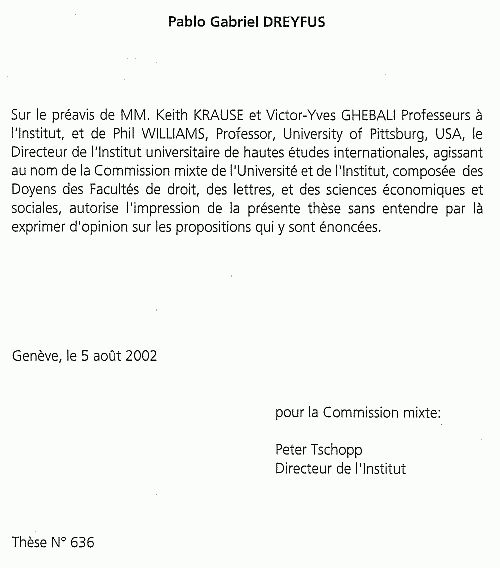UNIVERSITÉ DE GENÈVE
INSTITUT UNIVERSITAIRE DE HAUTES ÉTUDES INTERNATIONALES
Border Spillover
Drug Trafficking and National Security in South America
Thèse
présentée à l´Université de Genève
pour l´obtention du grade de Docteur en Relations Internationales
(science politique)
par
Pablo Gabriel DREYFUS
(de Argentine)
Jury :
Pr Keith KRAUSE, IUHEI, Genève
Pr Victor-Yves GHEBALI, IUHEI, Genève
Pr Phil WILLIAMS, University of Pittsburgh, USA
Thèse N° 636
Genève, 2002

Research for this dissertation was made possible by the 1996 Arditi Award in International Relations (Fondation Arditi, Geneva, Switzerland); a scholarship from The Graduate Institute of International Studies (HEI, Geneva, granted for the academic years 1995-96,1996-97, and 1998-99); and a research fellowship from the Swiss National Science Foundation, which that allowed me to stay as a Doctoral Research Fellow at the Matthew B. Ridgway Center for International Security Studies, Graduate School of Public and International Affairs / University Center for International Studies (GSPIA/UCIS), University of Pittsburgh during the academic year 1997-98, where I also received travel support and access to research facilities.
I also want to thank:
My family and my friends. They were always there.
Professors Keith Krause (HEI), Victor Yves Ghébali (HEI) and Phil Williams (University of Pittsburgh), for doing their jobs so well.
The staff of the library of The Graduate Institute of International Studies (Geneva), the United Nations library (Geneva), the library of the Institut Universitaire d´Études du Développement (IUED, Geneva), and the Hillman library of the University of Pittsburgh, for their help. I would like to extend special thanks to Mrs. Martine Basset from the inter-library loan section of HEI´s library and to the staff of the interlibrary loan department of the Hillman Library. I am also grateful to Mrs. Maung from the documentation section of the United Nations International Drug Control Programme (UNDCP) office in Vienna, Mrs. Sofía Kosmas from the Documentation Center of the Interamerican Drug Abuse Control Commission (CICAD-Organization of American States), Mrs. María del Carmen Acero, librarian of the Ministerio de Justicia y del Derecho, Dirección Nacional de Estupefacientes (Ministry of Justice and Law, National Drug Directorate) in Colombia (whom I never met personally but who mailed me invaluable statistical data), and to the personnel of the library of the Comisión Nacional Antidrogas (National Drug Control Commission CNA) of Venezuela.
All the people I interviewed for this dissertation for their time, help advice and sincerity.
Dr. Rosa del Olmo, Director of the Fundación Felix Ribas (Caracas, Venezuela), for her advice during my field research in Venezuela.
The staff of the Latin America and Caribbean Section of UNDCP (Vienna and La Paz) and the members of the UN Food and Agriculture Organization (FAO)-UNDCP team in the Chapare, who answered all my questions, were never annoyed at all by my curiosity, and took me everywhere they could during my field research in Bolivia.
The staff of OAS-CICAD for listening and answering.
The staff of the Argentine drug abuse prevention and drug trafficking control secretariat (SEDRONAR), the Central Data Division of the Dangerous Drugs Superintendence of the Argentine Federal Police, the Drugs and Defense Commissions of the Argentine Congress and the Comisión Nacional Antidrogas (CNA, Venezuela) for their openness and trust.
Jessica Galeria, from Viva Rio (Rio de Janeiro, Brazil) for careful editing of the English in the final version of this dissertation (including these acknowledgments).
